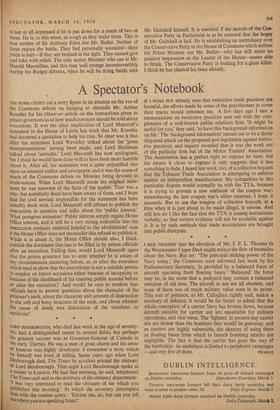IF I WERE NOT already sure that restrictive trade practices
are harmful, the efforts made by some of the practitioners to cover their tracks would convince me. A few days ago I saw a memorandum on restrictive practices sent out with the com- pliments of a well-known public relations firm. 'It might be useful for you,' they said, `to have this background information on file.' The 'background information' turned out to be a thinly disguised attack on the proposed new legislation against restric- tive practices; and inquiry revealed that it was the work not of the publicity firm but of the Motor Traders' Association. The Association has a perfect right to express its view; but the means it chose to express it only suggests that it has something to hide. I heard last week, too, of a collective boycott that the Tobacco Trade Association is attempting to enforce against an independent manufacturer. My sympathies in this particular dispute would normally be with the TTA, because it is trying to prevent a new outbreak of the coupon war; remembering the last coupon war's sillier excesses. I hope it succeeds. But to use the weapon of collective boycott, at a time when it is just about to be made illegal, is unwise. And still less do I like the fact that the TTA is issuing instructions verbally, so that written evidence will not be available against it. It is by such methods that trade associations are brought into public disrepute.


































 Previous page
Previous page